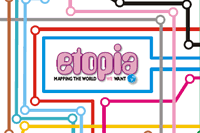Etopia - Mapping the World WE Want
Etopia | Friesland Workshop | Prague Workshop | WWW Workshop | Etopia E-Journal | World Ecitizens
 Why
Etopia?
Why
Etopia?
Marilyn Leask, who is a MirandaNet Fellow, has written extensively on ecommunities, and takes an optimistic stance on their potential. Marilyn has been influential in the development of teachers’ networked communities like TeacherNet, the MirandaNet Fellowship and IDEA communities. She explores a struggle between modernist optimism and post-modernist pessimism that has been evident in teacher professionalism since the 1980s, but she rejects these polarities. Instead she advises acceptance of uncertainty, the struggle between chaos and order, as a necessary element in human endeavour. In particular, she notes that this conflict appears in the kind of designs for systemic change in education that Fellows are engaged in. In this thesis the teacher as an educational researcher also takes on a development role and produces socio-cultural artefacts like digital networks that offer democratic, collaborative, proactive and inclusive means of investigating and distributing practice.
When MirandaNet wanted a name for its ecommunity, we coined the term etopia.
The word Etopia makes use of the e- prefix of ecommunities (and emails and ejournals and elearning and and the rest) and plays on the term Utopia ('no place') coined by Sir Thomas More, which in its turn refers to the kind of ideal world described in Plato's Republic.
Shakespeare also refers to this kind of idealised world when his heroine, Miranda, in the Tempest says, “Oh, brave new world that hath such people in IT”, and this is the MirandaNet tagline and where we get our name from. The MirandaNet ecommunity tagline underlines the optimism of members in the Utopian tradition. Even though the tools are new, by making this historical reference we draw attention to the eternal human desire to make a difference through education to the lives of young learners. In creating a multimodal Etopian tradition, MirandaNet Fellows have referenced the Utopian theme semiotically through the stylised Macintosh rose logo which was relevant to the introduction of personal computers in education because the movements also grew out of the same kind of ideals: that all people should have access to the tools of design, production and distribution. The Arts and Crafts movement foreshadowed the Modernists who hoped to build a clean new world for all after the first World War.
Recently in the UK we have been told to refer to ICT rather than IT, but Shakespeare was of course writing before this change was introduced. There is a MirandaNet myth that he would have been just as happy with “Oh, brave new world that hath such people in ICT”: he was after all a great multimodal man, always playing with words, and would no doubt have enjoyed playing with a computer.
We also prefer our interpretation of “Oh, brave new world” to that of Huxley's novel of the same name!
[Back]

